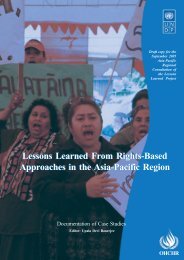View / Download - HRBA Portal
View / Download - HRBA Portal
View / Download - HRBA Portal
Create successful ePaper yourself
Turn your PDF publications into a flip-book with our unique Google optimized e-Paper software.
Towards Inclusive Governance: Promoting the Participation of Disadvantaged Groups in Asia-PacificProvisions) Act, as well as the Speedy Trial Act, bothof which have draconian bail provisions to ensurethe arrest and incarceration of individuals.During the conflict in the CHT, violence was notconfined to purely military targets or ‘armed’forces onboth sides but spread to ‘non-combatant’ Adivasi andnon-Adivasi civilian populations. While manyinstances of killing of Bengali settlers by the ShantiBahini were reported during these years, the Hillpeople were undoubtedly the victims of morewidespread and pervasive human rights violationsperpetrated by the security forces, often acting incomplicity with sections of the Bengali Settlers.There is little public information on theinvestigation or prosecution of those responsiblefor at least 11 major massacres of Hill people since1980. During the conflict period, political activistsand others were frequently held in ‘preventivedetention’, pursuant to the Special Powers Act.From the early 1990s, systematic legal supportbegan to be provided to Pahari detainees in suchcases. Today, 10 years after the Peace Accord, thePaharis’ situation with respect to enjoyment oftheir most fundamental rights remains very bleak.Failures on the part of successive Governments toimplement the terms laid down in the PeaceAccord and subsequent legislation have beenlargely to blame. Human rights defenders andothers continue to face harassment and arrestthrough abuse of laws and being implicated infalse cases.In the plains too, Adivasi households are oftensubjected to false cases. For example, members ofthe Mandi community claimed that since theForest Department has acquired land in Madhupur,it has been involved in illegal felling of trees, inmany cases compelling them to do so and thenimplicating them in criminal cases under the ForestAct. The legal indemnity for Forest Officers againstprosecution (under the Forests (Amendment) Act,2000) inhibits accountability for such acts ofharassment.Anti-Adivasi bias within law enforcement agenciesAdivasis appear to strongly perceive andexperience institutional bias, racism andcorruption within law enforcement agencies. Theyconsider that the agencies systematically favournon-Adivasi parties, either by instituting falsecriminal cases against them, or refusing to acceptcomplaints from Adivasis. Law enforcementagencies are also reported to act in complicitywith powerful interests, intent on the forcibleoccupation of Adivasi land. For example, ourinformants report that the police accept patentlyfalse cases against the inhabitants of reservedforests, including against disabled and infirmpeople! In the CHT, there is a perception of stateinaction in cases of organized violence againstAdivasis in the post-Accord period. The absence ofa multi-ethnic police force and of the failureto devolve law and order to the hill district councils(HDCs) exacerbates this perception, and perhapseven the reality.32



